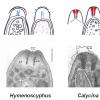
02-02-2026 21:46
Margot en Geert VullingsOn a barkless poplar branch, we found hairy discs

13-02-2026 18:05
Margot en Geert VullingsOn February 9, 2026, we found these small hairy di

14-02-2026 22:45
Hy!I would ask for some help determing this specie

15-02-2026 04:32
One more specimen that is giving me some descent a

09-02-2026 14:46
Anna KlosGoedemiddag, Op donderdag 5 februari vonden we ti

14-02-2026 19:09
Valencia Lopez Francisco JavierHola colegasEstoi interesado en este articulo, Agn

14-02-2026 10:58
 Bernard CLESSE
Bernard CLESSE
Bonjour à toutes et tous,Pourriez-vous m'aider à

13-02-2026 03:30
Hello! I found these immersed perithecia on a stic

12-02-2026 21:34
patrice CallardBonjour, la face inférieure des feuilles ce certa
phaeohelotium monticola ou flexuosum
christian Deconchat,
24-10-2008 02:26
j'ai trouvé sur polypore (Dedaleopsis confragosa ou tricolor) ces petits ascos jaunes/. Au micro, j'ai des spores uni ou biseptées qui correspondent assez bien a Phaeohelotium monticola (ref BK champignons de Suisse) mais j'ai vu dans les fiches un P. flexuosum qui est ressemblant. Peut-on m'indiquer les différences entre les deux taxons? Existe-t-il d'autres Phaeohelotium proches. Une clé de ce genre me serait utile. Merci
christian Deconchat.
Nicolas VAN VOOREN,
24-10-2008 07:46

Re:phaeohelotium monticola ou flexuosum
Christian,
voici la clé de travail de Bernard Declercq. La différence entre les espèces rattachées au genre Phaeohelotium porte sur plusieurs caractères microscopiques, il paraît difficile de répondre sur les maigres informations que tu nous fournis (et la photo des ascomes est petite !)
Bon courage.
voici la clé de travail de Bernard Declercq. La différence entre les espèces rattachées au genre Phaeohelotium porte sur plusieurs caractères microscopiques, il paraît difficile de répondre sur les maigres informations que tu nous fournis (et la photo des ascomes est petite !)
Bon courage.
christian Deconchat,
24-10-2008 08:43
Re:phaeohelotium monticola ou flexuosum
Merci Nicolas,
je vais essayer d'y voir plus clair.
c.deconchat
je vais essayer d'y voir plus clair.
c.deconchat
Hans-Otto Baral,
24-10-2008 12:45

Re:phaeohelotium monticola ou flexuosum
Hi Christian
I recommend first to test with iodine (Lugol), in order to exclude the genus Bisporella/Calycina. B. citrina is easily confused with such a Phaeohelotium/Hymenoscyphus. In the attach you see the strong differences. To see them needs oil immersion and dead asci (shortly heating the slide over a flame). Species around H- monticola may also be inamyloid.
Ph. flexuosum is a synonym of Hymenosc./Phaeoh. imberbis and has white apothecia which turn red-brown.
Zotto
I recommend first to test with iodine (Lugol), in order to exclude the genus Bisporella/Calycina. B. citrina is easily confused with such a Phaeohelotium/Hymenoscyphus. In the attach you see the strong differences. To see them needs oil immersion and dead asci (shortly heating the slide over a flame). Species around H- monticola may also be inamyloid.
Ph. flexuosum is a synonym of Hymenosc./Phaeoh. imberbis and has white apothecia which turn red-brown.
Zotto
christian Deconchat,
26-10-2008 18:34
Re:phaeohelotium monticola ou flexuosum
Merci Zotto de tes précieuses informations. Je vais essayer de voir tout cela de plus près.
christian Deconchat
christian Deconchat

 5584.doc
5584.doc